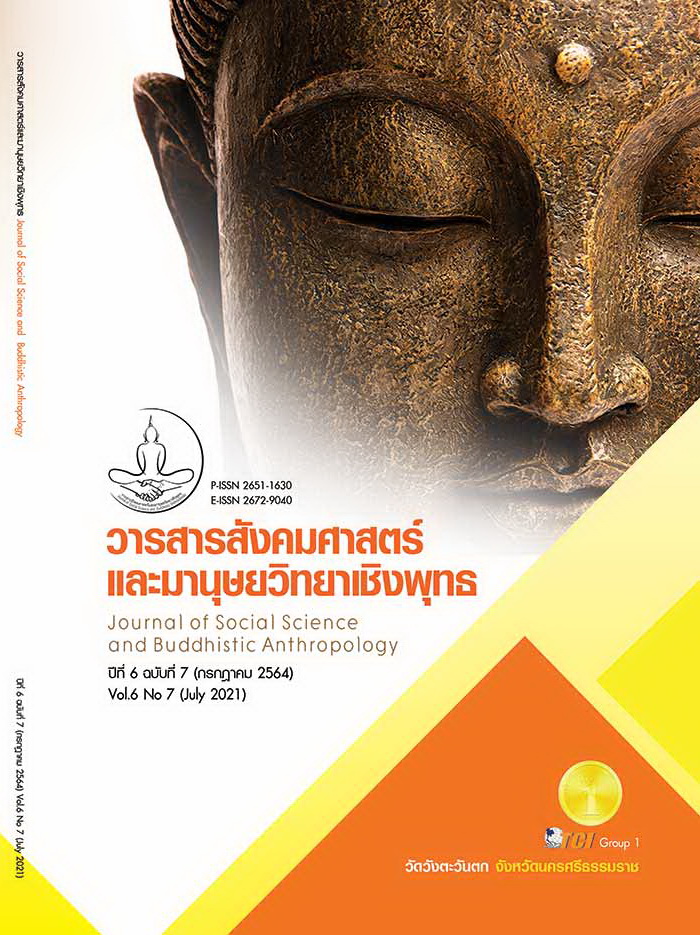APPROACHES TO DEVELOPING FUTURE TEACHER LEADERSHIP ENHANCING STUDENTS’ CHARACTERISTICS BASED ON THE HUMAN VALUE CREATING GLOBAL CITIZENSHIP CONCEPT: A CASE STUDY OF CHULALONGKORN UNIVERSITY STUDENT TEACHERS
Keywords:
Future Teacher Leadership Development Approaches, Students’ Characteristics Based on The Human Value Creating Global Citizenship Concept, Chulalongkorn University Student TeachersAbstract
The objectives of this research article were to: 1) Study the present and desirable states and priority needs of future teacher leadership development enhancing students’ characteristics; 2) Propose approaches for future teacher leadership development enhancing students’ characteristics based on the human value creating global citizenship concept: a case study of Chulalongkorn University student teachers. This study used a mixed - method approach: 1) Collecting the quantitative data using questionnaires for 220 student teachers from Chulalongkorn University, 68 school administrators and teacher mentors; 2) Gathering the qualitative data interviewing 60 student teachers and teacher mentors, plus an evaluation form for verifying the approaches by 16 experts, totally 304 respondents. Data were analysed by frequency, percentage, mean, standard deviation, PNIModified and content analysis. The research findings revealed that, overall, the present state of future teachers’ instructional management was at the high level, while the desirable state of future teachers’ leadership was at the highest level, and the aspect with the highest PNIModified was conducting knowledge and wisdom - based lives. There were 4 main approaches, 8 procedures and 5 goals to developing future teacher leadership: 1) Develop personal growth of student teachers to be the role models, with 2 procedures and 2 goals; 2) Exalt student teachers’ leadership competency, with 2 procedures and a goal; 3) Cultivate a model teacher’s spirituality, with 2 procedures and a goal and 4) Enhance student teachers’ potential to become the model researchers, with 2 procedures and a goal.
References
กัลยา โสภณพนิช. (2563). คุณธรรมนำความรู้ในการบริหารจัดการศึกษายุคดิจิทัล. ใน โครงการประชุมสัมมนาทางวิชาการ การนำเสนอผลงานวิชาการระดับชาติและงานบริหารสัมพันธ์ประจำปี 2563 ณ โรงแรมโลตัสปางสวนแก้ว จ. เชียงใหม่. สมาคมพัฒนาวิชาชีพบริหารการศึกษาแห่งประเทศไทย (สพบท.).
วิจิตร ศรีสอ้าน. (2563). กรอบพฤติกรรมภาวะผู้นำ (กพภ) โดย สถาบันพัฒนาภาวะผู้นำและนวัตกรรมสังคม มูลนิธิศาสตราจารย์ ดร.วิจิตร ศรีสอ้าน. ใน โครงการประชุมสัมมนาทางวิชาการ การนำเสนอผลงานวิชาการระดับชาติและงานบริหารสัมพันธ์ประจำปี 2563 ณ โรงแรมโลตัสปางสวนแก้ว จ. เชียงใหม่. สมาคมพัฒนาวิชาชีพบริหารการศึกษาแห่งประเทศไทย (สพบท.).
ศิริชัย กาญจนวาสี. (2552). ทฤษฎีการทดสอบแบบดั้งเดิม (Classical Test Theory). กรุงเทพมหานคร: สำนักพิมพ์แห่งจุฬาลงกรณ์มหาวิทยาลัย.
สำนักงานคณะกรรมการพัฒนาการเศรษฐกิจและสังคมแห่งชาติ. (2560). แผนพัฒนาเศรษฐกิจและสังคมแห่งชาติ ฉบับที่ 12 พ.ศ. 2560-2564. เรียกใช้เมื่อ 25 ตุลาคม 2563 จาก http://www.nesdc.go.th
สำนักงานเลขาธิการสภาการศึกษา. (2560). แผนการศึกษาแห่งชาติ (พ.ศ. 2560 - 2579). กรุงเทพมหานคร: สำนักงานเลขาธิการสภาการศึกษา.
. (2561). มาตรฐานการศึกษาของชาติ พ.ศ. 2561. กรุงเทพมหานคร: สำนักพิมพ์ ทเวนตี้เฟิร์สตเซ็นจูรี.
สุวิทย์ เมษินทรีย์. (2562). 'สุวิทย์' มุ่งพัฒนาครูไทยยุคใหม่. เรียกใช้เมื่อ 20 พฤษภาคม 2562 จาก https://www.bangkokbiznews.com/news/detail/847208
Bencsik, A. & Machova, R. (2016). Knowledge Sharing Problems from the Viewpoint of Intergeneration Management. Retrieved October 25, 2020, from https://books.google.co.th/books?hl=en&lr=&id=9kDQCwAAQBAJ&oi=fnd&pg=PA42&dq=related:xWovdoQ05MkJ:scholar.google.com/&ots=vA6z9Vb-eL&sig=Yrc6QwYfke3zzc5GEKRfKm3LM_o&redir_esc=y#v=onepage&q&f=false
Bourn, D. & Sharma, N. (2008). The role of engineers being positive in world change – issues and concerns of engineering graduates in UK. Municipal Engineer, ICE Journal, 161(3), 199-206.
Charoenkul, N. et al. (2019). School Management based on the Human Value Creating Global Citizenship Concept. A Research Report. Bangkok, Thailand: The RU-CU Value Creating Education Research Unit, Chulalongkorn University.
Fairman, J. C. & Mackenzie, S. V. (2012). Spheres of Teacher Leadership Action for Learning. In Professional Development in Education: Teacher Leadership and Professional Development. Special Issue, 38(2), 229-246.
. (2015). How Teacher Leaders Influence Others and Understand their Leadership. International Journal of Leadership in Education, 18(1), 61-87.
Filipczak, B. et al. (2000). Generations at work: Managing the clash of veterans, boomers, Xers, and nexters in your workplace. New York: AMACOM.
Ikeda, D. (2009). Soka Gakuen: A System for Cultivating Human Values. Tokyo: Printer Toppan Printing Co., Ltd.
Krejcie, R. V. & Morgan, D. W. (1970). Determining Sample Size for Research Activities. Educational and Psychological Measurement, 30(3), 607-610.
Pike, G. & Selby, D. (2000). In the Global Classroom, Vol. 2. 1st Edition. Ontario, Canada: Pippin Publishing.
Poekert, P. E. et al. (2016). How Teachers Become Leaders: An Internationally Validated Theoretical Model of Teacher Leadership Development. Research in Post Compulsory Education, 21(4), 307-329.
Salazar, Y. C. (2010). Teacher to Leader: A mixed methods approach to investigating teacher leadership in program improvement secondary schools. (Unpublished doctoral dissertation). Retrieved October 25, 2020, from http://sdsudspace
Sharma, N. (2018). Integrating Buddhist: Soka Perspectives within the UNESCO-Led Discourse and Practice of Global Citizenship Education. A Public Lecture In DERC Seminar Series for Development Education. Retrieved April 17, 2020, from https://www.youtube.com/watch?v=nDWlFatdGuQ&t=1536s
UNESCO. (2014). Global Citizenship Education Preparing learners for the challenges of the 21st century. France: UNESCO.
. (2014). Learning to Live Together. Bangkok, Thailand: UNESCO.









